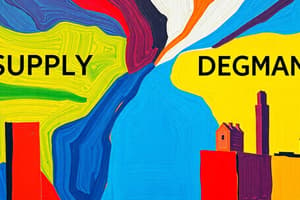Podcast
Questions and Answers
What is the definition of demand?
What is the definition of demand?
- The quantity of a good or service that buyers are willing and able to purchase at various prices. (correct)
- The maximum price that buyers are willing to pay for a good.
- The quantity of a good that buyers want regardless of price.
- The total amount of a good produced in a market.
How does the price of a commodity influence demand?
How does the price of a commodity influence demand?
- Higher price typically results in lower quantity demanded. (correct)
- Price has no effect on the quantity demanded.
- Higher price generally leads to higher quantity demanded.
- Demand increases regardless of the price changes.
What effect does an increase in the price of tea have on the demand for sugar, assuming they are complementary goods?
What effect does an increase in the price of tea have on the demand for sugar, assuming they are complementary goods?
- It increases the demand for both tea and sugar.
- It decreases the demand for sugar. (correct)
- It increases the supply of sugar.
- It has no impact on the demand for sugar.
Which of the following correctly describes substitute goods?
Which of the following correctly describes substitute goods?
What characterizes effective demand?
What characterizes effective demand?
Flashcards are hidden until you start studying
Study Notes
Demand
- Demand reflects the amount of a good or service consumers are willing and able to purchase at different prices within a specific timeframe.
- Desire alone is insufficient; consumers need the financial means to make a purchase.
- Effective demand incorporates desire, affordability, and willingness to pay.
- Quantity demanded is presented for a specific price and represents a continuous flow, not a single transaction.
Factors Affecting Demand
- Price:
- Higher prices lead to a lower quantity demanded, and vice-versa.
- This principle is governed by income and substitution effects.
- Price of Related Products:
- Complementary Goods: These are goods consumed together (e.g., tea and sugar). An increase in price for one complementary good typically reduces demand for both.
- Substitute Goods: These are goods that can be used interchangeably (e.g., butter and margarine). A rise in price of one substitute good increases demand for the other.
Studying That Suits You
Use AI to generate personalized quizzes and flashcards to suit your learning preferences.


